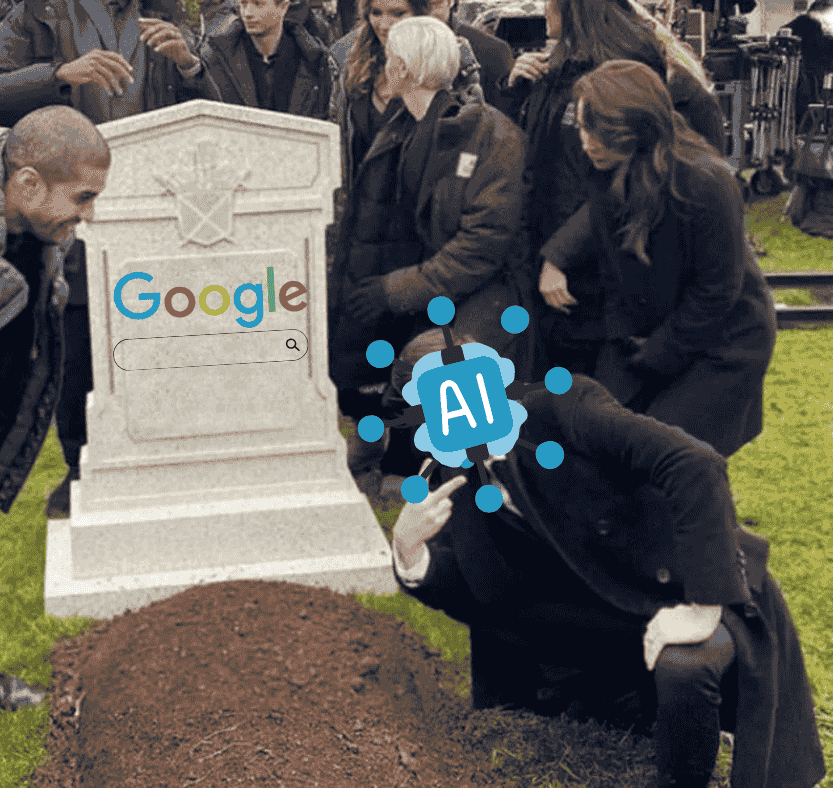Google AI and website traffic are at a crossroads, with creators questioning whether innovation is driving discovery or destroying clicks. Website traffic is tanking, and everyone is pointing fingers at Google’s AI. Is it stealing the web or just changing the game?
Let’s be real.
If you’re a content creator, publisher, SEO, or someone running a business site, the last year has felt like a punch to the gut. You spend hours creating great content, only to see fewer people clicking through. But why?
Because Google’s new AI Overviews are answering user queries directly in search results. And users don’t need to click anymore.
But according to Google, this isn’t a death sentence.
They say it’s evolution.
Is Website Traffic Dying or Just Changing?
Back in 2015, some said the web was “dead.”
“When we crawl, when we look at the number of web pages available to us, that number has gone up by 45% in the last two years alone. Right? So that’s a staggering thing to think of.” — Sundar Pichai, CEO of Google
The number of indexed pages is exploding. People are building sites, publishing articles, uploading videos, and launching blogs at record pace.
So what’s the problem?
The way people use the web has changed. We’re not starting our search on blogs or websites anymore. We’re starting it on TikTok, YouTube, Instagram, Reddit.
Creators? They’re skipping websites and going straight to social platforms. Even the founder of The Verge said that if he were starting now, he’d launch a YouTube channel, not a website.
But Google says the web is still alive. It’s just multi-format now. That means your article might also be a video. Or your blog post could be turned into a podcast using AI. Content is fluid. It’s built once and published across everything. If you’re struggling with adapting your strategy, this guide on How to Rank a New Website on Google is a great place to start.

What Google Says vs What Publishers Feel
Sundar Pichai, Google’s CEO, says:
- Query volume is up.
- Users are more engaged.
- Publishers are still getting traffic.
But data from the publishing world tells a different story.
- Some sites have lost up to 56% of their organic search clicks.
- AI Overviews now dominate the top of search results.
- Many users find what they need without clicking through.
The News/Media Alliance calls it theft. They say Google is using their content to feed AI with no return, and they’re not wrong to be pissed.
Google, on the other hand, insists it’s sending traffic to more sources, not fewer. But that traffic is spread out. Which means most publishers are getting a thinner slice of the pie.
Publishers rely on that link economy. AI Overviews break that by giving users answers without clicks. That’s the problem.
Need to stay visible despite this shift? Read The Future of AI in SEO for insights on adapting your content strategy in an AI-dominated search landscape.
AI Overviews: Helpful or Harmful?
Google says AI Overviews are part of the next phase of search. Instead of showing a list of links, the goal is to give you the right answer in a snapshot. No digging, no guesswork.
Sounds helpful, right?
Not if you’re the one who created the content. Because now your site doesn’t get the click.
Google argues that users still scroll down. That there’s still opportunity. But if you’ve looked at your analytics lately, you know it’s harder to get attention.
So what do you do?
Focus on content that answers questions better than any AI snapshot can.
Use visuals, examples, context, stories, and expert angles that AI can’t replicate. To stand out, consider following our SEO Blog Writing for Traffic Growth guide that’s built for the evolving search landscape.
What Does the Future Look Like?
Let’s zoom out.
Google says we’re heading toward a world of AI agents. That means:
- You won’t search like you do now.
- AI will handle tasks, book appointments, answer follow-ups.
- The web will become a data source, not a destination.
If you’re DoorDash or Uber, that’s terrifying.
Because in that world, you lose control of the user journey. The AI agent becomes the brand. You’re just the backend.
Some companies will fight this. Others will adapt and build experiences that serve both users and AI. That might mean structuring content for agents, building with schema markup, and prioritising data access.
Either way, things are changing. Fast.
Not sure what to prioritize? Check out A Visual Guide to Keyword Targeting and On-Page SEO to ensure your content stays optimized for both users and evolving AI systems.
Publishers vs Google: Who’s Right?
This isn’t a black-and-white fight.
Publishers built their entire business model on open web traffic.
Google built a search engine that now wants to be the answer engine.
The tension is about control.
Should Google be allowed to scrape, summarise, and serve without sending clicks back?
Or is this just the natural next step in a faster, AI-powered experience?
Whatever side you’re on, one thing is clear: If Google becomes the platform and the destination, everyone else gets squeezed.
What You Should Do Right Now
If you’re a content creator, small publisher, or SEO:
Here’s what matters going forward:
- Create original content with first-hand expertise.
- Focus on depth, clarity, and intent-matching.
- Use structured data so AI knows how to find and summarise your stuff.
- Answer real questions and anticipate follow-ups.
- Optimise for user experience — not just keywords.
And most importantly:
- Don’t create for search engines.
- Create for people.
Because that’s what Google says it’s rewarding.
AI Is the Platform. Are You Ready?
Google isn’t just evolving search.
It’s turning search into an app.
Each query could be a mini-experience, powered by AI. That means the old model of 10 blue links is done. The new model is real-time, conversational, personalised.
It’s fast. It’s smart. And it’s harder than ever to get a slice.
But there’s still opportunity.
If your content is good. If it’s trustworthy. If it provides value that can’t be summarised in a sentence.
We’re not just writing for people anymore. We’re writing for people through AI.
FAQs
Is website traffic really declining due to Google’s AI Overviews?
Yes, many publishers report significant traffic drops, with some data showing up to 56% decline in organic clicks.
Does Google claim AI is helping or hurting web traffic?
Google claims AI Overviews and features like “AI Mode” are increasing overall engagement and query volume. They say they’re sending more traffic to a wider range of sources.
What is AI Mode in Google Search?
AI Mode is a new search experience that gives users real-time, interactive answers — sometimes in the form of tools, summaries, or visual apps directly on the search page.
Should I still focus on SEO?
Yes, but with a shift toward people-first content that provides genuine value, not just rankings. That includes E-E-A-T (Experience, Expertise, Authoritativeness, Trustworthiness) signals.
How do I structure content for the future?
Focus on:
- Clear headers (H2, H3, etc.)
- First-hand experience
- Originality
- FAQs and visual elements
- Intent-matching
- Structured data and schema
Is the web really dying?
No. But its role is shifting. It’s moving from being a destination to a backend data layer that AI tools pull from.
Final Word
The death of website traffic isn’t a myth.
But it’s not the whole story either.
The web is still here. It’s just changing. If we want to stay relevant, we need to change with it.
And part of that is creating better content, with more depth, more value, and more intent.
Want help adapting? We also offer professional content writing services to make sure your message cuts through the noise.
